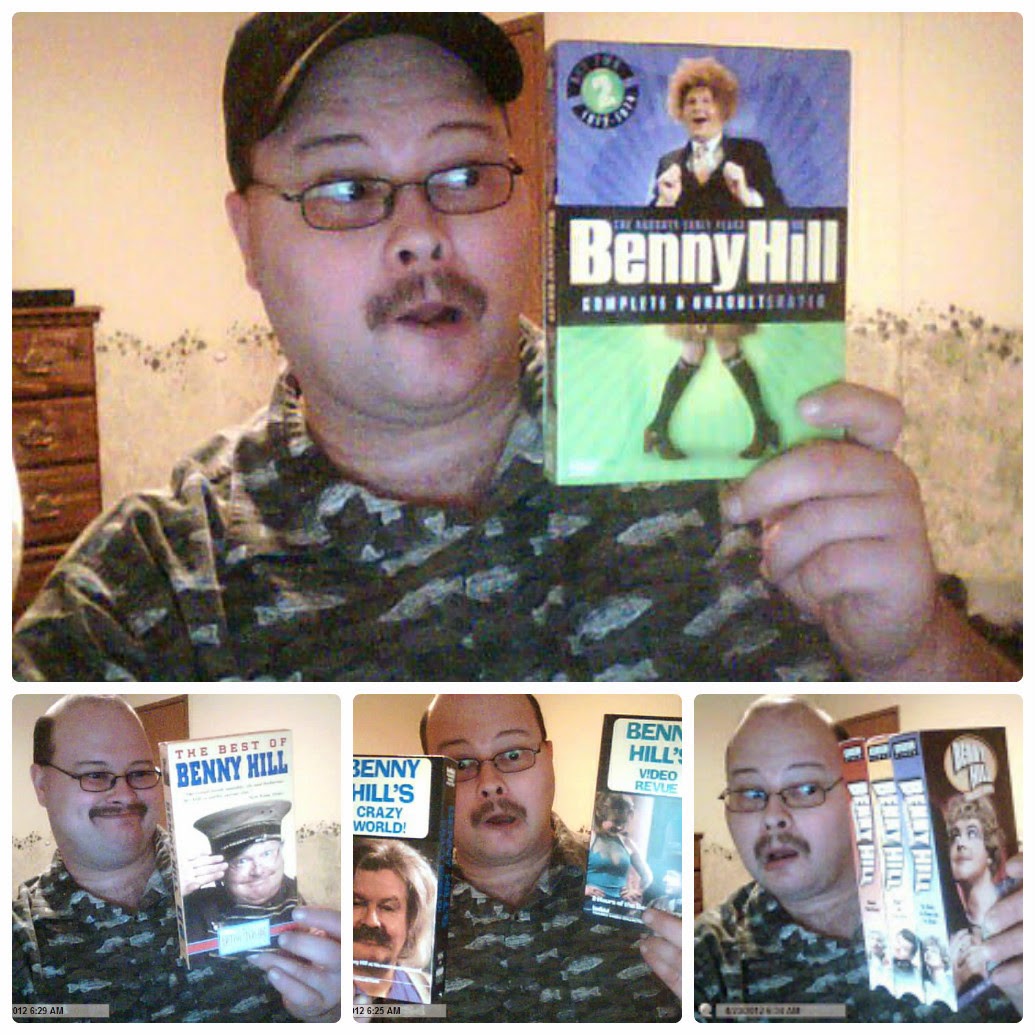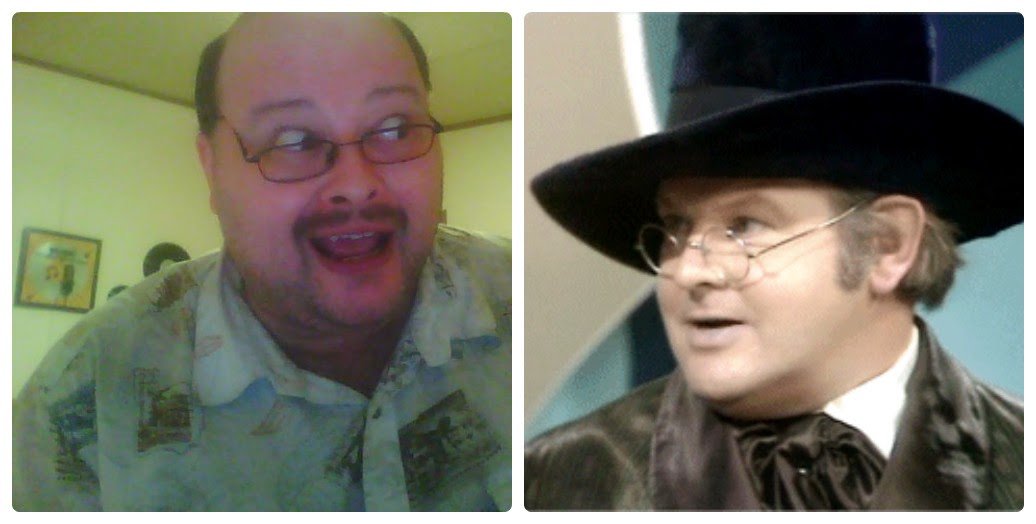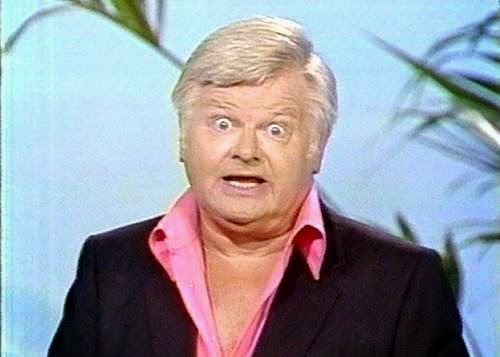Do you remember the first time you heard of Jack Benny? Are you among those that discovered him in the decades after his death? Did you witness his career first hand and do you remember the time he had a weekly television series? Are you among the age group that remembers hearing Jack Benny on radio each Sunday night at 7? Going further back, do you know of anybody that remembers Jack Benny as a performer in Vaudeville? This week marks something sad in American comedy...something that happened 40 years ago this week on December 26, 1974. That is the day the physical world lost Jack Benny at the age of 80. His television and radio programs, movies, magazine articles and books about him, and a host of documentaries about his life and career have kept him 'alive' in the time since. I became aware of Jack Benny through my grandfather. I used to spend the weekends with my grandparent's and every Sunday morning on the local PBS station my grandfather would be up watching reruns of Jack's program. I'd watch out of curiosity, at first, but even at that young of an age I had some sort of an attachment to classic TV and I still can't easily explain the reason for it.
Do you have a favorite cast member? Excluding it's star, Jack Benny, which other cast member ranks high on your list? Jack had a small regular cast and a large recurring/ensemble cast made up of character actors and actresses. The main cast during much of it's radio run during it's golden period happened to be: Jack Benny, Mary Livingstone, Eddie 'Rochester' Anderson, Don Wilson, Dennis Day, and Phil Harris. Some of the ensemble cast included the likes of: Mel Blanc, Frank Nelson, Artie Auerbach, Sam Hearn, Benny Rubin, Verna Felton, Bea Benaderet, Sara Berner, Joseph Kearns, Sheldon Leonard, Barbara Pepper, among others. Phil Harris left the radio cast in 1952 (after 16 seasons) and his spot was taken over by Bob Crosby for the remaining 3 seasons of the radio program. Bob later appeared, infrequently, on Jack's television program. One of his most notable episodes being the one guest starring Humphrey Bogart.
Do you have a favorite comic device? Jack's on-air cheapskate character became so believable that some felt he truly did have a moat, alligators, falling knives, a vault, and a security guard in his basement protecting the fortune. It also helped that Jack embellished and played up this character trait in numerous personal appearances on talk shows and on other comedian's programs (such as Burns and Allen, The Fred Allen Show, and The Red Skelton Show).
In one radio episode it's revealed that Jack loves money so much he kept a stack of Confederate money in his vault just in case there's another Civil War. Jack remarks to himself, as he's eying his millions, that if the South would've won he'd have been a billionaire.
Are you familiar with the running gag of his age being 39? It stopped at 39...and a lot of blogs and other fan-created offerings include "39" somewhere in their tributes and salutes as an in-joke. In my blog title I chose to use "40" because this marks the 40th anniversary of his 1974 death.
Did you know that he really didn't live right next door to Ronald and Benita Colman? On radio the couple made several visits and portrayed themselves as living right next door to Jack...he was always inviting himself to their upper-class dinners or their other high society gatherings. Even on episodes that didn't feature Ronald and Benita, in person, Jack often referred to them as his next door neighbors and counted them among his most loyal friends (comments like that brought in huge laughs due to Jack's obliviousness to the Colman's real feelings.)
As you can tell these are comical situations...requiring the zero use of one-liners or actual joke telling to induce laughter. It's been said that Jack's radio format featured the first known use of the elements that make up a conventional sitcom (an abbreviation for situation comedy).
I have several books about Jack's life and career. The oldest one is the book that his manger, Irving Fein, wrote entitled, Jack Benny: An Intimate Biography, published in 1976...
One of the ironies of life are critics. One of the funniest things, to me, are the consistent criticisms by those that read whatever it happens to be pertaining to Jack Benny and then proceed to criticize some publication for either being overly critical and negative or being glossed over and positive. Such polarizing feelings are largely because of how passionate one happens to be about Jack's career. Having said that it must be brought up that the authors of the books are not exactly movie or television critics. In the case of Irving Fein, he happened to be Jack's manager and therefore his style of storytelling and his recollections are largely going to center around his personal, first-hand experiences dealing with Jack and the Hollywood establishment and his recollections are going to be business-oriented but at the same time relay information about Jack's career, too. The book has a photograph section...and yes, some of the photo's I've not seen become available on-line and so this book continues to be the only place to find some of these images. I wrote a book review in January 2004 on Amazon and if you're interested in reading it here's the LINK. That must have been several weeks or months after I had purchased the book.
This rare, one of a kind book is something I often mention during moments like this when I salute Jack Benny but I don't believe I've ever posted an image of it on-line before!?! It's been in my possession for probably as long as the other books...since the mid 2000s. This one is a great reference book. It's called Jack Benny: The Radio and Television Work. It's publication year is 1991 and it's by The Museum of Television and Radio. This may not be a book that's entirely appreciated by the masses but it's great for those like myself who like to read about Jack's radio and television appearances and learn about specific air-dates, network affiliation, sponsors, cast line-ups, and guest stars. I snapped a picture of the back of the book, too. On page 128 the famed mock feud with Fred Allen is dissected, nearly episode by episode, starting in the mid '30s and going forward. The book is broken into various sections and segments...presumably each section being written by a member of the Museum at the time of the book's publication. There are fabulous pictures of Jack and the rest of the gang from the radio and television years. The book has a passage from William S. Paley (former CBS President), Robert Batscha (Museum President), and a Foreword by Larry Gelbart (comedy writer primarily known for M*A*S*H).
As a kid the thing that stood out the most for me is that among the Jack Benny cast was Mel Blanc (voice of many cartoon characters...Bugs Bunny being the most popular).
Mel Blanc, in character as Professor LeBlanc, is filled with annoyance and extreme hostility and contempt for Jack's expertise (?) at the violin. Professor LeBlanc and Jack had a signature comic routine built around a violin lesson. In the routine Jack would play a series of notes, half good, and the Professor would sing comical insults about Jack's playing. Here's one I made up...if you are familiar with the melody sing-a-long with LeBlanc: "Tune the strings a little higher -- You're no Heifetz I'm no Liar". Professor LeBlanc is just one of the many characters that Mel Blanc portrayed on Jack's radio and television programs. Aside from the Professor, one of Mel's most famous characters is Sy, a Mexican from Tijuana. In the comic routine Jack and Sy exchanged greetings...actually, Jack did most of the talking while Mel's character delivered one word responses. As usual, Jack played the straight man to Mel's antics. In fact, while known for being a comedic icon, Jack often played the straight man during many of the sketches and monologues. He didn't deliver rapid fire jokes or tell one-liners or delve into topical humor. Jack's humor is rooted in situations and conversations...hmmm, let's see...doesn't the phrase 'Situations and Conversations' sound like a great title for a seminar on Jack Benny??. No? Okay then...it'll remain part of the blog entry's title.
On radio and later, on TV, Mel Blanc made annual appearances during the Christmas episodes. Often cast as a sales clerk, Mel's character at the start of the episode is happy, calm, pleasant, and eager to help any customer. Jack purchases a gift...simple enough...but here's where the comedy comes in: Jack constantly changes his mind over what to buy a cast member for Christmas (usually announcer Don Wilson). Each time he visits Mel he either exchanges a gift for something else or he's forgotten to sign the gift card or he's written something on a gift card that he has since changed his mind about. Each and every time Mel has to catch the delivery man and retrieve the gift, Jack makes his changes, and off it goes to the delivery room once more...ready to be mailed out. Moments later, Jack would make another visit to Mel's counter. Visibly angered and near tears, Mel already prepares himself for Jack's inevitable wish to change something about the gift...and off he goes to the delivery room to try and catch the delivery driver before the truck takes off.
This remains one of several must-see memorials that aired following Jack's death 40 years ago. This one is hosted by Charles Kuralt and it features many appearances of Jack's radio and TV co-stars and peers.
Kelsey Grammer hosted a nice tribute to Jack in 1995...
Jack Benny and Frank Nelson bicker and converse about an upcoming airplane flight. Given that the routine takes place later in the episode, for those that hadn't seen the beginning, you aren't going to get the joke that Frank delivers near the end of his scene...
In the collage below there's Jack and character actor Charlie Cantor. He played various dimwit characters on Jack's radio and television programs; earlier he portrayed Socrates Mulligan in the original version of Allen's Alley on Fred Allen's radio program; most famously portrayed Clifton Finnegan on Duffy's Tavern. In the photo in the top right is Dennis Day (the program's tenor singer). Then it's the program's long-time announcer, Don Wilson, and next to Don is the orchestra leader, Phil Harris. Phil has a second appearance in the bottom row featuring his wife, Alice Faye. Lastly there's Jack and the Colman's reading over a script.
Amidst those highly entertaining figures that became associated with Jack Benny there is one cast member that you couldn't do a salute to Jack Benny without having this person mentioned somewhere...and that person is Eddie "Rochester" Anderson. For pretty much the length of the Jack Benny run on American entertainment, both on radio and on TV from the early 1930s through the early 1970s, Rochester typically had his share of on-air time and later, screen time...often poking fun at his boss' reputation for being cheap and refusing to purchase a modern-day car. Rochester acted as Jack's butler, chauffeur, cook, and tended to the outside chores (gardening, mowing the yard, etc. etc.). I believe Rochester also as in charge of keeping Jack's various pets fed: Carmichael the Polar Bear and Polly the Parrot (both voiced by Mel Blanc) and the alligators in the basement. Rochester always had a comical zinger to deliver and his scenes often ended with those. His exposure increased more and more in the television years as the setting became much more of a traditional, domesticated sitcom. On radio, since the Rochester character worked at Jack's house, he wasn't written to be a part a part of Jack's celebrity world and the only times Rochester would be heard interacting with Dennis Day or Phil Harris, for example, is if they visited Jack's house. The program had a show-within-a-show format. Scenes involving Rochester took place at Jack's house.
 |
| "Okay Boss...Pay Up..." |
Jack Benny died on December 26, 1974 at the age of 80 due to complications from Pancreatic Cancer. He was buried on December 29, 1974...ironically on a Sunday...
 |
| Jack Benny: 1894-1974 |

















